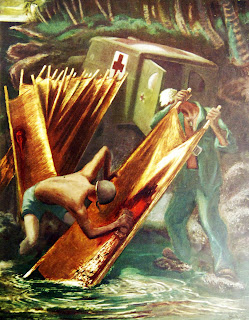―
“Individualism
attacks the authority of family, church, and private association. The
family is said to be oppressive, the fount of our miseries. It is denied
that the church may legitimately insist upon what it regards as moral
behavior in its members. Private association are denied the
autonomy to define their membership for themselves.
“The upshot
is that these institutions, which stand between the state and the
individual, are progressively weakened and their functions increasingly
dictated by or taken over by the state. The individual becomes less a
member of powerful private institutions and more a member of an
unstructured mass that is vulnerable to the collectivist coercion of the
state. Thus does individualism prepare the way for its
opposite.”
―
“Some of our elites…professors, journalists, makers of motion
pictures and television entertainment, et al.…delight in nihilism and
destruction as much as do the random killers in our cities. Their
weapons are just different.”
―

When I was attending a DoDEA high school (I later transferred to a civilian magnet school), I was a cheer leader and one of our cheers to razz the opposing teams was: "Cornbread! Chicken! Rice! Peas! We got higher SATs!" Heh. But I guess it's an obsolete chant now. Soon nobody will even know what an SAT score was.
“To be a man is, precisely, to be responsible. It is to feel, when setting one's
stone, that one is contributing to the building of the world.”
―
 It bemuses me how often on-line commenters quarrel with and insult each other. But it can be eye-opening. You really get a picture of how people think and what they believe with no social Styrofoam cushioning their interactions.
It bemuses me how often on-line commenters quarrel with and insult each other. But it can be eye-opening. You really get a picture of how people think and what they believe with no social Styrofoam cushioning their interactions. The other day one commenter put down another who had often referred to his days in the military by saying that he had voluntarily served the globohomo empire and now had PTSD as a result. That bothered me on a number of levels.
First, the guy who was always mentioning his days serving Uncle Sam and keeping America safe I was skeptical of because I know lots of veterans and active duty and not one -- I repeat: not one -- has ever said anything flag-wavingly patriotic. I could sum up their attitude by what one former
 Marine said once: "You know what I learned from my deployments? I learned how to say with real sincerity, 'Fuck this shit!'" That rings true.
Marine said once: "You know what I learned from my deployments? I learned how to say with real sincerity, 'Fuck this shit!'" That rings true. Second, I don't know and can't imagine anybody enlisting in order to serve "the globohomo empire," whatever that is. People join up for personal reasons: because a relative you look up to did, you want to learn a trade or get financial aid for college, you want to get away from home or the crummy town you live in, you are bored, sick of going to school and need a break, or some very personal reason that you are not about to tell anyone.
And third, PTSD
 is not something to be made light of. Sure, sure, some people fake it, and some people who have no clue what real PTSD is like claim to have it for all sorts of trivial reasons. But PTSD is real and it is caused by physical damage to the brain that can only be discerned by examining brain tissue under a microscope post-mortum. Sometimes not even then, depending on what caused the PTSD. To trivialize the condition or imply someone has it for the views they express on some stupid on-line blog post comment section is contemptible.
is not something to be made light of. Sure, sure, some people fake it, and some people who have no clue what real PTSD is like claim to have it for all sorts of trivial reasons. But PTSD is real and it is caused by physical damage to the brain that can only be discerned by examining brain tissue under a microscope post-mortum. Sometimes not even then, depending on what caused the PTSD. To trivialize the condition or imply someone has it for the views they express on some stupid on-line blog post comment section is contemptible. “Self-control is the chief element in self-respect, and self-respect is the chief element in courage.”
―

History is full of obscure zigs and zags, seemingly minor events that turn out to be major turning points in history. Often they are never widely known, and usually only blundered across by detail-oriented history buffs. An example:
One result of President Franklin Roosevelt ignoring his new vice president Harry Truman and keeping his plans limited to only those whom he believed it essential to keep informed was, in retrospect, probably a catastrophic misunderstanding.
bitterly disappointed with Stalin; in fact, it seems he was furious with Stalin. Both men had acted high-handedly toward Roosevelt and the US, as if they were on the same economic level with America when both were actually essentially bankrupt and would need US economic aid even after the war with Germany was concluded.

Neither knew that at the Yalta conference Stalin only agreed to attack Japan if Lend-Lease was continued into the post-war years. So maybe Roosevelt had had second thoughts about involving the Soviet Union in the war against Japan, possibly because of progress in the development of the atomic bomb.
What Roosevelt was thinking we will never know, but when, just 10 days later, Sen. Taft (R-OH) introduced an amended bill ending Lend-Lease when Germany surrendered, and 34 Republicans, 4 Democrats and 1 Progressive voted for it and 37 Democrats and 2 Republicans voted against it, creating a 39-39 tie, Vice-President Harry Truman jumped to his feet and shouted, "The chair votes no!" breaking the tie and
continuing Lend-Lease. Truman thought he was doing what the president wanted.
Had Roosevelt briefed Truman on the situation with Stalin and the Soviet Union as well as Churchill and Britain, the months and years after his death might have been very much different. As it was, Truman was left to learn the dog-eat-dog world of international politics on his own.
“The nation that will insist on drawing a broad line of demarcation
between the fighting man and the thinking man is liable to find its
fighting done by fools and its thinking done by cowards.”
―







































